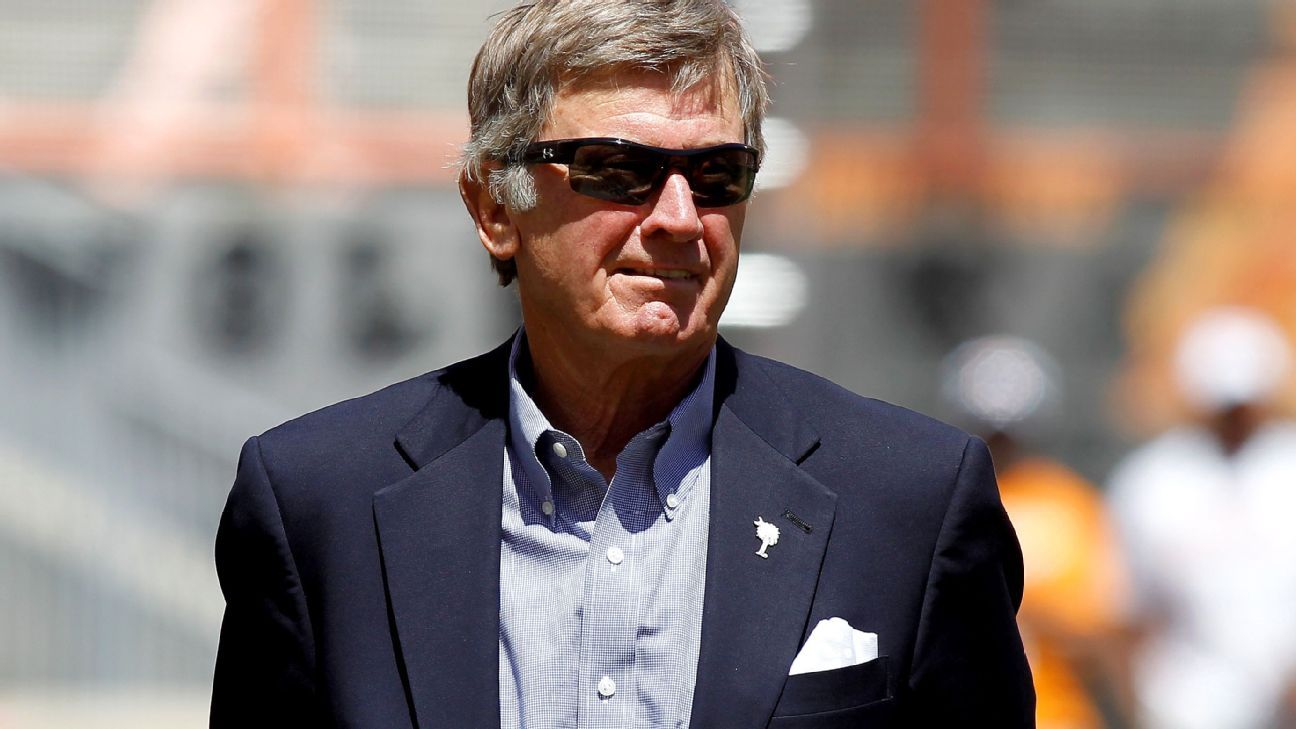“I’m speechless (for the) first time in my life,” Ole Miss coach Lane Kiffin said. “I kept saying, ‘This can’t really be happening. Is this real life?’ I still haven’t moved from my seat. Should’ve been on Pay-Per-View.”
Kiffin, who is always active on Twitter, has shown support for Saban, his former boss, during the two-day ordeal.
It’s no surprise that Kiffin, the former Alabama offensive coordinator, backed Saban.
It was Kiffin, on the eve of National Signing Day, who didn’t mince words about Fisher and A&M.
“I joked the other day I didn’t know if Texas A&M was going to incur a luxury tax and how much they paid for their signing class,” he quipped.
Gamecock Fanatics
You are using an out of date browser. It may not display this or other websites correctly.
You should upgrade or use an alternative browser.
You should upgrade or use an alternative browser.
Nick vs. Jimbo
- Thread starter kingofnerf
- Start date
Nick Saban saying the quiet parts out loud. Though I doubt bama is all in the clear on this.
If Saban has evidence that TA&M cheated he should turn it over to the SEC. If not he needs to STFU.
Nick Saban is complaining that other schools now have more (legal) tools to compete with the Big Crimson Machine.
I think it's kinda funny that NIL is causing the coaches of programs that everybody knows has been paying players all along to go after each other.
LOL
LOL
I think he was just trying to tell A Group of boosters they need to step up their game if they want to continue to enjoy the dominance. I don’t think he was complaining, but challenging them. He just screwed up in naming teams, but agin I think he was saying A&M boosters were kicking their butts. I found Jimbo”s response ironic in that he was a part of what he calls despicable under Sabin for years. Jimbo has his own skeletons so he may want to be careful of what he wants to reveal or someone is going to loud him out as well. I cannot disagree that there need to be some kind of parameters put on the “nil “ funding. I am also curious if it is true that Sankey told Kiffin he could not go on the Dan Patrick show to talk about what was going on.
Spurrier's comments are pretty accurate and funny.
Care to share?Spurrier's comments are pretty accurate and funny.
Yeah, I think the problem is Saban most likely not know he was being recorded or that it would end up on the Internet.I think he was just trying to tell A Group of boosters they need to step up their game if they want to continue to enjoy the dominance. I don’t think he was complaining, but challenging them. He just screwed up in naming teams, but agin I think he was saying A&M boosters were kicking their butts. I found Jimbo”s response ironic in that he was a part of what he calls despicable under Sabin for years. Jimbo has his own skeletons so he may want to be careful of what he wants to reveal or someone is going to loud him out as well. I cannot disagree that there need to be some kind of parameters put on the “nil “ funding. I am also curious if it is true that Sankey told Kiffin he could not go on the Dan Patrick show to talk about what was going on.
Or maybe he did. LOL
Care to share?

Spurrier: 'Saban say something that wasn't true?'
Hall of Fame coach Steve Spurrier came to the defense of Alabama's Nick Saban, asking if there was something in the Crimson Tide coach's pointed comments about Texas A&M that wasn't true. Said Spurrier: "I don't think Saban told any lies in there."
That Texas oil money brings with it a lot of temptation.

 en.wikipedia.org
en.wikipedia.org
All I know is I hate the Aggies and want to beat them as much I do Clemson.
Hopefully both of those things happen this coming season.

SMU Mustangs football - Wikipedia
"Death Penalty" and decades of rebuilding (1987–2007)
Main article: Southern Methodist University football scandal
In 1987, SMU football became the first, and only, football program in collegiate athletic history to receive the "death penalty" for repeat violation of NCAA rules; that is, having a sports program fully terminated for a determined amount of time. SMU's football program was terminated for the 1987 season because the university was making approximately $61,000 in booster payments from 1985 to 1986. It later emerged that a slush fund had been used to pay players as early as the mid-1970s, and athletic officials had known about it as early as 1981.
SMU was eligible for the "death penalty" because it had been placed on probation in 1985 for recruiting violations. Since many potential student-athletes were poor, boosters would induce them to sign with SMU by offering them payments and expense coverage. Several key boosters and administration officials determined that it would not only be unethical to cut off those payments, but also potentially problematic as some boosters were contractually obligated to pay the athletes for the duration of their time at SMU. There was also the real potential of disgruntled football players "blowing the whistle" on SMU should the payments not continue. When the sanctions were handed down, SMU had three players – all seniors about to graduate – receiving payments. Not long afterward, SMU announced that its football team would stay shuttered for the 1988 season as well after school officials received indications that they wouldn't have enough experienced players to field a viable team,[10] as most of the team had left the university and transferred to other institutions. Forrest Gregg, an SMU alum who was the head coach of the Green Bay Packers, was hired in 1988 to help rebuild the team. The decimation of the program meant that Gregg was left with an undersized and underweight lineup.
The Mustangs struggled for 20 years to recover from the effects of the scandal. Coach Gregg compiled a 3–19 record in his two seasons. He moved on to be the SMU Athletic Director from 1990 through 1994. The program's chances of ever recovering were likely ruined by the collapse of the Southwest Conference after the 1995 season; SMU wound up in the WAC and later in Conference USA.
The Mustangs had three more head coaches and only one winning season through the completion of the 2007 season.
All I know is I hate the Aggies and want to beat them as much I do Clemson.
Hopefully both of those things happen this coming season.

